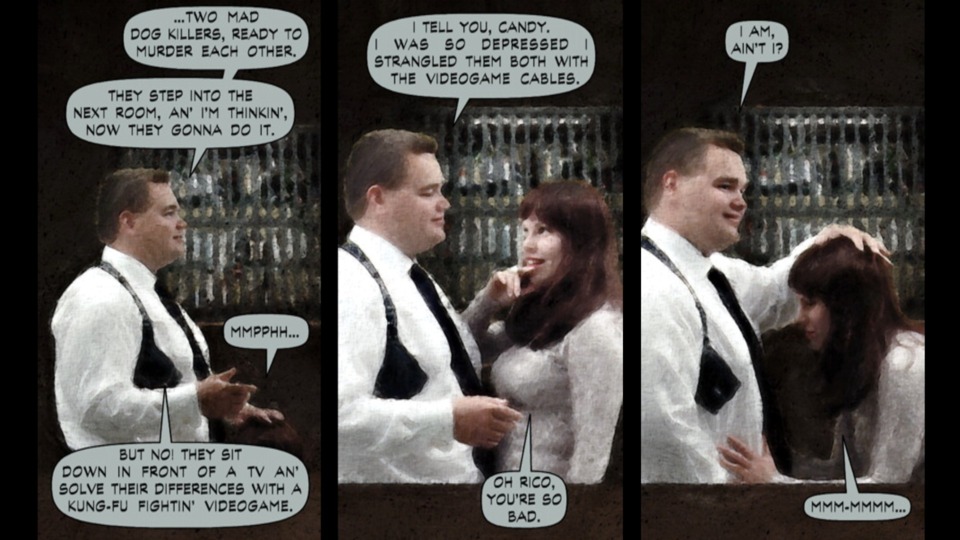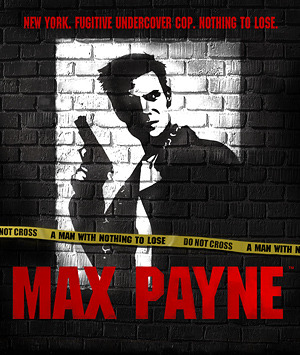Maximum Payne, Minimum Fat
Remedy's first Woo/Matrix inspired, action packed, third-person shooter in the Payne franchise delivers on what you might expect yet is somewhat limited in scope compared to their future efforts. People might remember the Max Payne games as a moody homage to noire detective thrillers, interrupted by bouts of exaggerated slow motion action but the reality on both accounts is surprisingly different.
The story (although creatively executed through comic book panels, expressive art, and some iconic musical themes) couldn't be more generic but that's OK because of the unique tone that remedy has struck and are now somewhat known for. From the outset it may look like a dire tale of a cop whom's family is murdered, framed for the death of a fellow DEA agent and on the run through an abandoned New York City (by way of that good old excuse, a dire blizzard) killing his way up a chain of endless wacky criminals and mob families to eventually discover a deeper conspiracy. Max Payne is remembered in part for its great story but the writing and structure themselves aren't particularly well executed, with far too many criminals, conspiracies, and betrayals for even Max's gravely narration to keep track of, and a fractured narrative structure that serves to confuse rather than contextualise the events of the story. Apart from some major Wikipedia plot points, if you asked me to tell you what happened in the first Max Payne I would draw a blank. The inherent character and tone that Remedy bring are what makes the story engaging. It manages to both take itself seriously and be incredibly self knowing, occasionally fourth wall breaking, and treading into pastiche territory upon occasion. There are some very funny in-game TV show's to watch and NPC conversions to overhear which break the tension of the story and combat, and give what is essentially an endless series of rooms to shoot though a sense of place within a larger world. The flavour of the story and the slow motion shooting mechanics and are't just the core of the experience, they are the experience.

Despite the bevy of weapons (including duel pistols, shotguns, Uzi's, rifles, and some more ridiculous shit later on!) the gameplay loop consists of shooting your way through endless empty subway stations, hotels, office complexes, and gang hideouts, slow-mo launching yourself into a room filled with enemies while clumsily contorting your body into odd poses as you attempt to leverage your limited time to exert the maximum amount of payne. It's clumsy and unrefined but undeniably fun. A modern interpretation would feature better animations for jumping over cover and other contextual actions but this is mainly of visual importance. Only some occasional unintuitive environmental puzzle design hinders your endless slaughter.
The way the game is balanced is somewhat of a double edged sword. It's quite difficult and unforgiving (Max will perish in a few shots without downing a few dozen handfuls of delicious painkillers) to incentivize accuracy, the use of the slow-motion mechanic, and to make fights feel satisfying. The downside is that it prevented me from getting too creative with the tools they had given me. I ended up sticking to particular lines of sight and repeating consistently successful moves whilst fantasising about slow-mo launching myself down a spiral staircase or letting lose on dozens of enemies in the open, but I guess there are always cheats for that sort of thing. The levels are designed as a series of rooms with limited scripted events, it's all very simple (with only unlock-able difficulties and time trial modes offering replay value) and as such, can become repetitive although new weapons and drips of narrative context motivated me to continue despite this.
The first Payne outing is about establishing a tone and a gameplay rhythm that would later be refined upon as well as showing off some impressive graphical fidelity (if you can ignore Muppet hands and Max's permanently constipated facial expression) and slow motion technological accomplishments that were impressive for the time and still hold up today. Max Payne 2 is the superior game in every way, making the first seem like more of a proof of concept or a tech demo with a smaller scope by comparison, but all the ingredients are here and they still make for a fun game.
